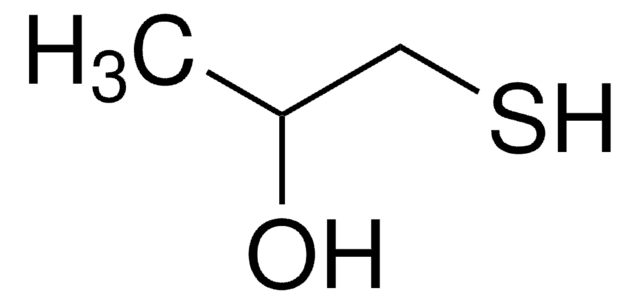725382
1,6-Hexanedithiol
99.5%
Sinonimo/i:
1,6-Dimercaptohexane, DMH, Hexamethylene dimercaptan
About This Item
Prodotti consigliati
Tensione di vapore
~1 mmHg ( 20 °C)
Saggio
99.5%
Forma fisica
liquid
Indice di rifrazione
n20/D 1.511 (lit.)
P. eboll.
118-119 °C/15 mmHg (lit.)
Punto di fusione
−21 °C (lit.)
Densità
0.983 g/mL at 25 °C (lit.)
Stringa SMILE
SCCCCCCS
InChI
1S/C6H14S2/c7-5-3-1-2-4-6-8/h7-8H,1-6H2
SRZXCOWFGPICGA-UHFFFAOYSA-N
Cerchi prodotti simili? Visita Guida al confronto tra prodotti
Descrizione generale
Applicazioni
Codice della classe di stoccaggio
10 - Combustible liquids
Classe di pericolosità dell'acqua (WGK)
WGK 3
Punto d’infiammabilità (°F)
195.8 °F - closed cup
Punto d’infiammabilità (°C)
91 °C - closed cup
Scegli una delle versioni più recenti:
Certificati d'analisi (COA)
Non trovi la versione di tuo interesse?
Se hai bisogno di una versione specifica, puoi cercare il certificato tramite il numero di lotto.
Possiedi già questo prodotto?
I documenti relativi ai prodotti acquistati recentemente sono disponibili nell’Archivio dei documenti.
I clienti hanno visto anche
Articoli
Recent research highlights tunable properties of inorganic nanoparticles, driving interest in optoelectronics.
Il team dei nostri ricercatori vanta grande esperienza in tutte le aree della ricerca quali Life Science, scienza dei materiali, sintesi chimica, cromatografia, discipline analitiche, ecc..
Contatta l'Assistenza Tecnica.











